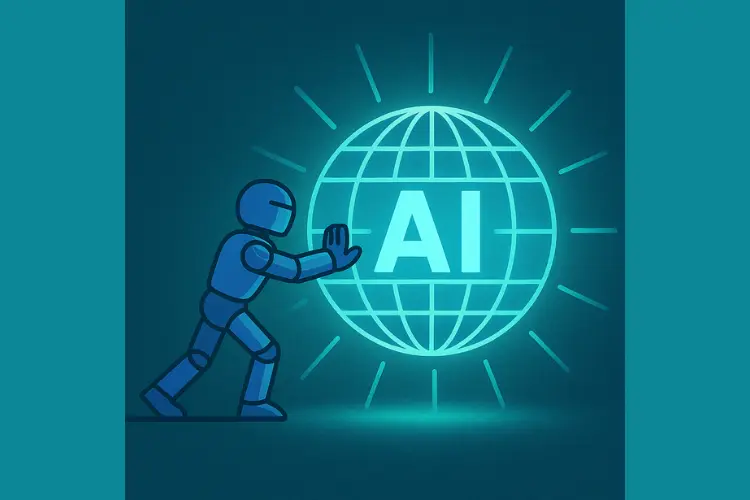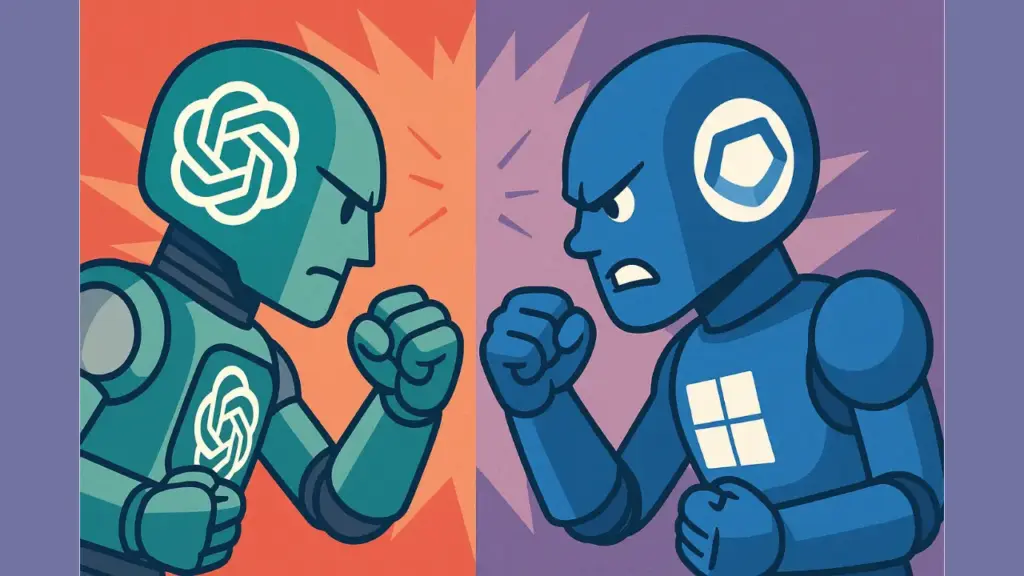Introduction
Artificial intelligence has become the center of innovation. Tools like ChatGPT and Microsoft Copilot are reshaping how individuals and enterprises use technology. ChatGPT’s rapid rise showed the world the potential of conversational AI. At the same time, Microsoft made a strategic move by integrating Copilot into its 365 suite. This integration changed how businesses approach AI.
But a critical question is emerging: Is ChatGPT’s dominance at risk? While millions of users flock to the platform, enterprise adoption tells a different story. Microsoft’s clever positioning with Copilot might be shifting the balance of power. Add in concerns over recent cybersecurity incidents, and the future of AI leadership looks uncertain.
ChatGPT’s Meteoric Growth
ChatGPT launched and quickly became a cultural phenomenon. Millions of users adopted the tool within months. From students writing essays to developers generating code, ChatGPT’s versatility made it a household name.
One of its biggest strengths lies in its accessibility. Anyone can sign up and start using AI instantly. It offers a wide range of applications, including content creation, coding support, and customer service automation. This democratization of AI disrupted multiple industries.
However, this rapid growth was driven mainly by individual users and small businesses. Large-scale enterprise adoption has not matched the consumer excitement. For OpenAI, this gap is a critical challenge to solve.
Enterprise Adoption: The Missing Link for ChatGPT
Enterprises often move cautiously when adopting new technologies. For ChatGPT, this has meant slower growth in the corporate world. There are several reasons for this:
- Security concerns: Companies handle sensitive data and need AI systems to meet strict compliance standards.
- Integration challenges: Businesses require AI that blends seamlessly with their existing tools.
- Cost and control: Enterprises want tailored AI solutions that provide full control over data and customization.
OpenAI has made progress with enterprise offerings like ChatGPT Enterprise and API integrations. However, the competition is intense. Microsoft has an edge because it already powers much of the enterprise software ecosystem.
This is where the role of a Fractional CTO becomes vital. Startups and growing businesses often use fractional CTO services to evaluate AI tools. These technical leaders guide companies in choosing solutions that balance innovation with security. Many of them recommend tools that integrate easily into current workflows, which is where Microsoft’s Copilot gains ground.
Microsoft Copilot’s Strategic Advantage
Microsoft’s decision to embed Copilot directly into 365 products was a masterstroke. Word, Excel, Outlook, and Teams are already staples in the business world. Adding AI assistance into these platforms gives enterprises immediate value without changing their existing workflow.
Copilot’s advantage is its ecosystem. Enterprises trust Microsoft for compliance, security, and scalability. This trust makes it easier for companies to adopt Copilot without hesitation. From generating reports in Excel to drafting emails in Outlook, Copilot becomes a natural extension of tools employees use daily.
Microsoft also benefits from its partnership with OpenAI. By leveraging GPT models within its own products, Microsoft gets the best of both worlds: cutting-edge AI combined with enterprise-grade integration.
For startups and growing companies, this integration reduces friction. Many rely on fractional CTOs to streamline tech adoption. A tool that doesn’t require building new infrastructure is often preferred. Microsoft’s Copilot fits that description perfectly.
The Microsoft Hack: Impact on AI Trust
Despite these advantages, Microsoft’s journey hasn’t been flawless. The recent Microsoft hack raised concerns about security. Enterprises depend on AI tools to handle sensitive data. Any breach can shake confidence.
This incident highlighted a crucial issue: as AI becomes more integrated into business workflows, security must evolve. Companies are now asking tougher questions about how their data is stored, processed, and protected.
For OpenAI, this presents an opportunity. ChatGPT can position itself as a more secure alternative for certain enterprise use cases. Offering robust compliance and transparent security measures could help bridge the adoption gap.
For businesses, this is where a Fractional CTO plays a key role again. Evaluating AI tools after such security incidents requires technical expertise. Fractional CTOs can compare risks, assess vendor security, and ensure businesses choose tools that meet regulatory standards.
The Future of AI Integration
The AI landscape is evolving rapidly. For ChatGPT, the next step is deeper enterprise integration. OpenAI is expanding partnerships and building features tailored to corporate users. Offering customization, on-premises deployment, and enhanced data security could help capture enterprise trust.
Microsoft, on the other hand, will continue leveraging its ecosystem. Copilot’s success depends on how well it balances innovation with security. The company must learn from the recent hack and reinforce enterprise confidence.
Another critical factor is the rise of Fractional CTOs in shaping AI adoption. Startups and mid-sized businesses often rely on these experts to navigate the complex AI ecosystem. Their decisions influence which tools gain traction in the business world. Both OpenAI and Microsoft will need to win their approval to dominate enterprise AI.

Conclusion
The race between ChatGPT and Microsoft Copilot is more than a battle of features. It’s a clash of strategies. ChatGPT captured the hearts of individual users and small businesses with its accessibility and versatility. Microsoft, however, leveraged its enterprise ecosystem to gain a foothold in the corporate world.
The outcome will depend on how each addresses its current gaps. For ChatGPT, it’s about winning enterprise trust. For Microsoft, it’s maintaining security while scaling AI integration. The role of Fractional CTO will be crucial in this race, as they shape how startups and enterprises choose their AI tools.
As we move forward, one thing is clear: AI is no longer a niche tool. It’s becoming a core part of how businesses operate. Whether ChatGPT or Microsoft Copilot leads the next era, the competition will fuel innovation. For tech enthusiasts, startups, and enterprises, this is just the beginning of a transformative journey.
At StartupHakk, we see this AI race as a defining moment in technology. The decisions made today will shape the future of work, productivity, and innovation. The question remains: who will wear the AI crown tomorrow?




